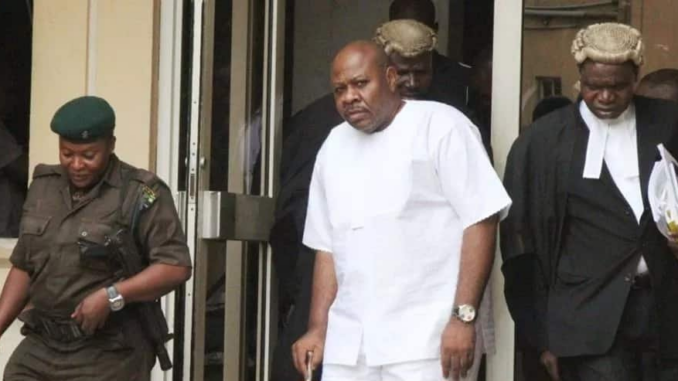
Lagos-based businessman and socialite Fred Ajudua, who is on trial for allegedly defrauding a German company of $1.43 million over 30 years ago, has reportedly gone into hiding following a Supreme Court order mandating his return to prison, SaharaReporters has learned.
In a unanimous decision delivered on Friday, the Supreme Court overturned the ruling of the Court of Appeal, declaring that the appellate court erred in granting Ajudua bail. The apex court subsequently ordered his immediate remand in correctional custody.
“Ajudua escaped after the Supreme Court ordered that he should be returned to prison,” one of the sources who disclosed this to SaharaReporters said.
Whether Ajudua is still in Nigeria or has fled the country remains unclear.
The Supreme Court ordered the immediate return to prison of Fred Ajudua, who is standing trial for allegedly defrauding a German company of $1.43 million more than 30 years ago.
In a unanimous decision delivered on Friday, the apex court ruled that the Court of Appeal erred in granting Ajudua bail and directed Justice Mojisola Dada of the Lagos State High Court to resume proceedings in the long-running case.
Ajudua, once a well-known socialite and businessman in the 1990s and early 2000s, has faced multiple high-profile fraud allegations. His legal troubles trace back to the early 1990s when he was accused of obtaining $1 million from a German businessman through an advance fee fraud scheme—commonly known in Nigeria as a “419” scam.
He was initially arraigned before Justice Josephine Oyefeso of the Lagos High Court, but the case was later refiled by the Economic and Financial Crimes Commission (EFCC) and reassigned to Justice Dada.
At his re-arraignment on July 6, 2018, Ajudua applied for bail on medical grounds, citing deteriorating health. Justice Dada, however, denied the application, referencing the prolonged history of the case.
In a letter dated August 26, 1993, the Embassy of the State of Palestine accused Fred Ajudua of obtaining approximately $1.43 million by false pretence from Ziad Abu Zalaf, a Palestinian businessman based in Germany. The letter was addressed to the then Minister of Foreign Affairs and copied to the Inspector General of Police.
Following an investigation into the allegations, the Economic and Financial Crimes Commission (EFCC) filed a 12-count charge against Ajudua before the High Court of Lagos State in Ikeja.
According to the EFCC, Ajudua conspired with an accomplice, Joseph Ochunor, to defraud Zalaf, who was acting on behalf of Technical International Ltd, a division of the Germany-based Mystic Company Ltd.
The EFCC alleged that on April 2 and May 12, 1993, Ajudua and Ochunor fraudulently obtained $268,000 and $225,000 respectively from Zalaf under false pretences. To lend credibility to the scam, the pair allegedly forged official receipts from the Central Bank of Nigeria and the Nigerian National Petroleum Corporation, which they presented as genuine.
Following his arraignment, Ajudua’s counsel, Olalekan Ojo, filed for bail on health grounds. However, the application was denied by Justice Mojisola Dada of the Lagos High Court, who ordered that the defendant face trial.
Dissatisfied with the ruling, Ojo (SAN) appealed the decision at the Court of Appeal in Lagos. In its judgment, the appellate court, led by Justice Mohammed Garba, granted Ajudua bail, affirming it as a constitutional right and allowing him to remain free under his previous bail conditions.
The EFCC, however, challenged the appellate court’s decision at the Supreme Court, arguing that the appeal court had failed to properly consider the gravity of the charges and Ajudua’s history of stalling the case.
In its ruling on appeal number SC/CR/51/2019, the Supreme Court overturned the Court of Appeal’s decision to grant bail. Delivering the lead judgment, Justice Chioma Nwosu-Iheme held that the appellate court lacked the jurisdiction to grant bail after having earlier struck out Ajudua’s brief of argument for being incompetent.
The Supreme Court concluded that since the brief of argument was invalid, any further consideration or ruling based on it was legally void and amounted to an exercise in futility.
SaharaReporters’ attempts to reach Umar Abubakar, spokesperson for the Nigerian Correctional Service (NCoS), were unsuccessful, as he neither answered calls nor responded to messages.
